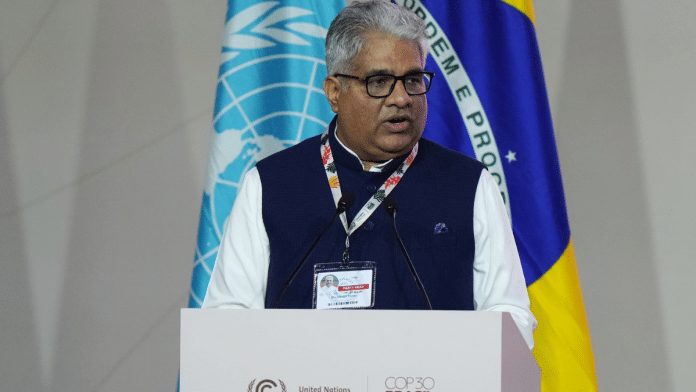Belém (Brazil): The frustration expressed by several smaller countries at COP30 has a historic parallel in India, which has consistently maintained its opposition to all pressure on climate actions that do not take into account its social and economic interests.
When nations, such as Mauritius and Sierra Leone, emphatically told the United Nations at COP30 that they have almost nothing to do with the climate crisis and yet are expected to “do their bit”, it was a reminder of how little the needle has moved on climate justice over the past three decades. This anger is India’s, too.
“If you look at it in a historical context, India is one of those countries that did not cause climate change. From [the start of] industrial times to date, India’s share in global greenhouse gas emissions is less than 5 percent. So even if today India is a large emitter, historically its contribution is very small, and it still has a lot to do,” Sameer Kwatra, senior director at the US-based non-profit Natural Resources Defense Council, told ThePrint at the COP30 venue in Belém.
On Wednesday, Brazil failed to secure an early climate deal at COP30. President Luiz Inácio Lula da Silva, though, remains optimistic, despite deep divisions among nations on key issues.
Given that India’s history mirrors that of other nations that historically have not been significant emitters but are facing the brunt now, India has a great opportunity to take a leadership position.
“There is potential for India’s leadership on two really important issues for small island developing states or low-income countries: adaptation and finance,” Kwatra said. “These countries can’t be expected to take on large-scale mitigation measures. They’re too small.”
He agreed with the countries voicing their disappointment in Brazil over the expectations heaped on them by the historically bigger polluters.
The United States and the European Union are the largest cumulative carbon dioxide emitters since the Industrial Revolution started in the 1850s.
“It’s really important that vulnerable countries and smaller economies—those that do not have the power or means to impact global emissions—get their fair share of support,” Kwatra said.
The base for such support was established in the Paris Agreement 10 years ago, when it was decided that the process of tackling climate change must be bottom-up rather than top-down. Kwatra explained what that meant—instead of doing arithmetic on everyone’s targets, it was left to countries to determine what they can do best.
“Countries on the frontline of climate impacts have very high moral authority. It’s right for them to demand more action, more support, more collaboration—and most importantly—more finance,” he said.
Finance remains one of the thorny issues—an “undercurrent” driving every consideration, deliberation, and even opposition at the climate summits, including at COP30.
“The LDC (‘least developed countries’) proposal to triple adaptation finance is not only reasonable, it is necessary. It is one of the most sensible and constructive ideas on the table at COP30, and it deserves strong support,” said Mattias Söderberg, Global Climate Lead, DanChurchAid, an NGO based in Denmark.
Still, the COP summit remains the only major platform for such countries where they can expect to be heard.
“This is why I like this multilateral process, despite all its flaws. This is one forum in which Uganda has the same voice as the United States or the United Kingdom,” Kwatra said.
This is where India’s decisive role comes into play. And it comes from India’s stature.
Among the largest economies, the largest present carbon emitters, and most at risk from climate impacts, India has “a very strong voice” in the world and at the UNFCCC process, Kwatra said.
“Who cares about humanity more than India? Is any solution to the climate crisis possible without India being part of it? That world doesn’t exist,” he said.
(Edited by Madhurita Goswami)
Also Read: Turkey to host COP31 as standoff ends, Australia will lead climate negotiations






